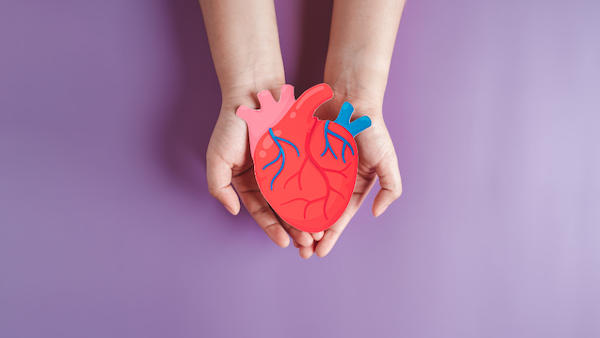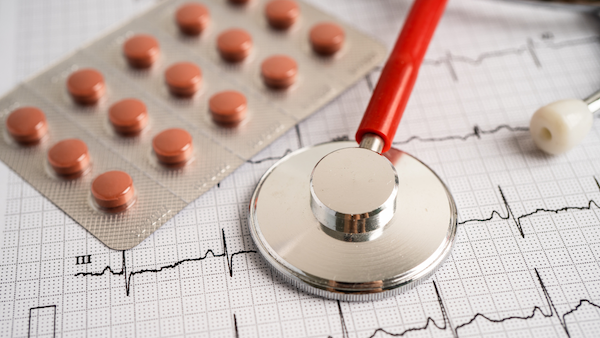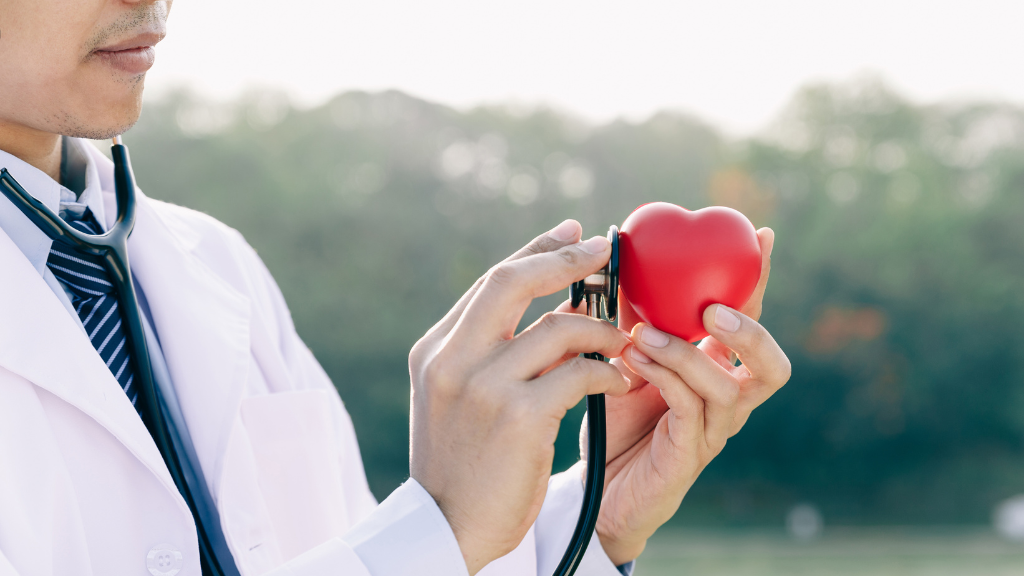Heart arrhythmia is a condition where the heartbeat has an abnormal rhythm. When not diagnosed and managed effectively, heart arrhythmia can lead to more serious health issues. To help you better understand heart arrhythmia, we’ve put together a guide:
What is heart arrhythmia?

Heart arrhythmia (pronounced uh-rith-me-uh) is a condition that causes an abnormal heart rhythm, either by beating too fast, too slowly, or irregularly. In the UK, more than 1.5 million people experience heart rhythm problems.
While many can manage the condition and continue to live a normal life, the condition needs to be diagnosed and carefully managed. The British Heart Foundation estimates that around 270,000 over 65s have undiagnosed heart arrhythmia.
There are many different types of abnormal heart rhythms (or arrhythmias). These include:
- Atrial fibrillation (a fast heart rhythm).
- Atrial flutter (one heart chamber beats faster than the rest).
- Heart blocks (blockage in the heart’s conduction system that lowers heart rhythm).
- Supraventricular tachycardia (a very fast heart rhythm).
- Tachybrady syndrome (periods of slow or fast heart rhythms).
All heart arrhythmias are caused by a problem with the heart’s conductive system. It is the conductive system that sends electrical pulses to keep your heart ticking over nice and healthy. Disruptions to these electrical pulses affect your heart rate (beats per minute).
A healthy heart rate should be between 60 and 100 beats per minute. Heart arrhythmia causes your heart rate to be continually lower or higher than the healthy range depending on the type of abnormal heart rhythm.
Irregular heart rates can be categorised as followed:
- Tachycardia – a fast heart rate, with a resting heart rate of more than 100 bpm.
- Bradycardia – a slow heart rate, with a resting heart rate of less than 60 bpm.
Heart rate can change depending on certain activities. For example, heart rate increases during physical exercise and slows down during sleep. Your heart can also skip a beat occasionally too. Heart arrhythmia is when an irregular rhythm is frequent or long-lasting.
Blood pressure monitors will usually give you a heart rate reading, alongside your blood pressure. Consider using an upper arm blood pressure monitor to check your heart rate.
What are the symptoms of heart arrhythmia?
Heart arrhythmias can display a range of different symptoms and will affect everyone differently. Some may only have slight symptoms, such as a racing or fluttering heart. Others may have more bothersome side effects. Others may not display any symptoms at all.
Heart arrhythmia symptoms to look out for include:
- Chest pain or discomfort
- A fluttering feeling inside your chest (heart palpitations)
- Shortness of breath
- Feeling dizzy, lightheaded, or losing consciousness
- A consistent high or low heart rate
- Fatigue and sweating
Spotting the symptoms early can help you minimise the risk of developing more serious long-term health complications. If you experience the symptoms of heart arrhythmia, it is important to see your GP to receive proper treatment.
What are the causes of heart arrhythmia?

There are many causes of heart arrhythmia. Previous underlying heart conditions are a leading cause of irregular heart rhythms. Other common triggers and causes include:
- Damage to the heart tissue resulting from a heart attack, heart failure, or coronary heart disease.
- Faulty or damaged heart valves.
- Heart medications.
- Viral infections, such as severe COVID-19.
- Imbalance of electrolytes in your blood.
- Healing after heart surgery.
- Disruptions to the electrical signals that keep your heart beating.
Other triggers and risk factors that can affect your hearts rhythm include:
- Drinking excessive alcohol
- Smoking or drugs
- Age
- Family history of heart disease or heart arrhythmia
- Medical conditions, such as diabetes, high blood pressure, or high cholesterol
- Excessive caffeine consumption
- Excessive stress, exertion, or strain
How does heart arrhythmia affect your health?

Heart arrhythmia can affect people differently, depending on the type and severity of your heart arrhythmia. Even those with a healthy heart could still experience arrhythmia. The earlier you are diagnosed with heart arrhythmia, the better for your long-term health.
There are a few methods a health professional could use to diagnose heart arrhythmia:
- Electrocardiogram (ECG) – a device that electrically monitors your heart rhythm.
- Cardiac event recorder – a device used to monitor occasional arrhythmic symptoms over a long period.
- Electrophysiological (EP) study – a test to detect problems with the electrical signals of the heart.
- Echocardiogram – an ultrasound scan of your heart.
If left untreated, heart arrhythmia can lead to more serious long-term and life-threatening health issues. Restricted or irregular blood flow resulting from a heart arrhythmia can cause damage to the brain, heart, and other organs.
The damage caused to organs and the brain rapidly increases your risk of a stroke, cardiac arrest, or heart failure. Fortunately, most heart arrhythmias can be treated or managed through medication. The earlier they are discovered, the better for your health.
Irregular heart rhythms are a contributing factor to 1 in 5 strokes. It is estimated that those with heart arrhythmia are five times more likely to suffer from a stroke. Heart arrhythmia can also weaken the heart muscles, leading to a greater risk of heart failure.
Most people can continue living a normal life with heart arrhythmia. This can be achieved either by taking medication or making lifestyle changes, such as avoiding certain activities that trigger arrhythmia. Such changes may help heart rhythm irregularities from getting worse.
The treatment you receive will depend on the type and severity of your heart arrhythmia. Treatments can include:
- Medication, such as anti-arrhythmic.
- Surgery, such as valve surgery or an artery bypass.
- Lifestyle changes, such as losing weight or reducing alcohol/caffeine intake.
- Devices and implants, such as pacemakers.
- Therapy, such as cardioversion.
The earlier heart arrhythmia is diagnosed and treated, the better for reducing the risk of serious complications. If you experience any of the symptoms outlined above, it is important you visit your GP as soon as possible. That way, you can take better control of your health and continue to live a normal life.

